情态动词详解+例句
情态动词总结
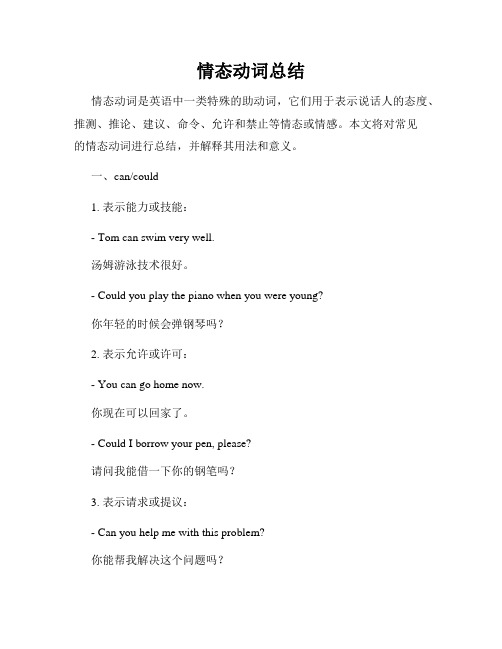
情态动词总结情态动词是英语中一类特殊的助动词,它们用于表示说话人的态度、推测、推论、建议、命令、允许和禁止等情态或情感。
本文将对常见的情态动词进行总结,并解释其用法和意义。
一、can/could1. 表示能力或技能:- Tom can swim very well.汤姆游泳技术很好。
- Could you play the piano when you were young?你年轻的时候会弹钢琴吗?2. 表示允许或许可:- You can go home now.你现在可以回家了。
- Could I borrow your pen, please?请问我能借一下你的钢笔吗?3. 表示请求或提议:- Can you help me with this problem?你能帮我解决这个问题吗?- Could we have lunch together tomorrow?明天我们一起吃午饭好吗?4. 表示推测或猜测:- It can't be true! I don't believe it.这不可能是真的!我不相信。
- They could be at the park. Let's check there.他们可能在公园。
我们去看看吧。
二、may/might1. 表示允许或许可:- May I use your phone?我可以用你的手机吗?- Might I have another piece of cake?我可以再要一块蛋糕吗?2. 表示请求或建议:- May I ask you a question?我可以问你一个问题吗?- You may consider taking a break.你可以考虑休息一下。
3. 表示推测或猜测:- She may be late for the meeting.她可能会迟到开会。
- It might rain tomorrow, so bring an umbrella.明天可能会下雨,所以带把伞吧。
情态动词的用法
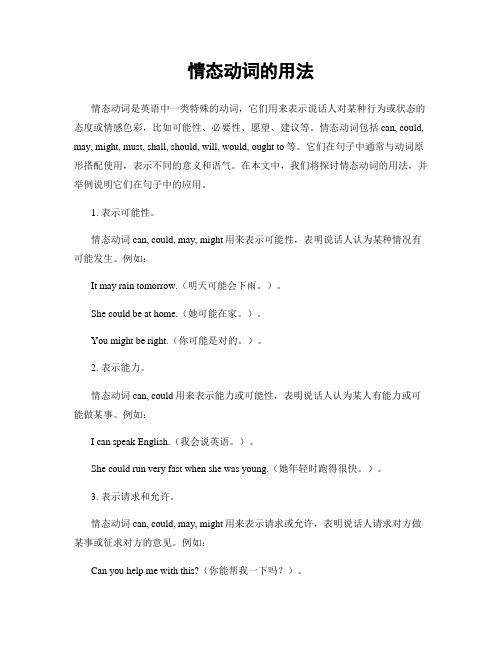
情态动词的用法情态动词是英语中一类特殊的动词,它们用来表示说话人对某种行为或状态的态度或情感色彩,比如可能性、必要性、愿望、建议等。
情态动词包括can, could, may, might, must, shall, should, will, would, ought to等。
它们在句子中通常与动词原形搭配使用,表示不同的意义和语气。
在本文中,我们将探讨情态动词的用法,并举例说明它们在句子中的应用。
1. 表示可能性。
情态动词can, could, may, might用来表示可能性,表明说话人认为某种情况有可能发生。
例如:It may rain tomorrow.(明天可能会下雨。
)。
She could be at home.(她可能在家。
)。
You might be right.(你可能是对的。
)。
2. 表示能力。
情态动词can, could用来表示能力或可能性,表明说话人认为某人有能力或可能做某事。
例如:I can speak English.(我会说英语。
)。
She could run very fast when she was young.(她年轻时跑得很快。
)。
3. 表示请求和允许。
情态动词can, could, may, might用来表示请求或允许,表明说话人请求对方做某事或征求对方的意见。
例如:Can you help me with this?(你能帮我一下吗?)。
Could I use your pen?(我可以用一下你的笔吗?)。
May I come in?(我可以进来吗?)。
4. 表示必要性。
情态动词must, should, ought to用来表示必要性或建议,表明说话人认为某种行为是必要的或值得做的。
例如:You must finish your homework before you go out to play.(你必须在出去玩之前完成作业。
)。
You should apologize to her.(你应该向她道歉。
14个情态动词及其用法

14个情态动词及其用法14个情态动词及其用法如下:1.can:表示能力,用于疑问句或否定句中表示惊异、怀疑、不相信等态度。
如:Can you speak English?你会说英语吗?2.could:表示过去的能力或可能性。
表示惊异、怀疑、不相信等态度时,可用could。
如:Could you have done this?你真的能做到这个吗?3.may:表示可能性。
用于请求、允许、祝愿等场合。
如:May I borr ow your book?我能借你的书吗?4.might:表示可能性,比may更委婉。
如:Might I have your attenti on,请大家注意。
5.must:表示肯定、确定,用于陈述事实或推测。
如:The game must be over,比赛应该结束了。
6.need:表示需要、必要性。
如:We need to finish this task today。
我们今天需要完成这个任务。
7.ought to:表示应该、应当,用于表示道义上的责任或推测。
如:Yo u ought to help him,你应当帮助他。
8.dare:表示勇气、敢。
如:Dare you jump off the bridge?你敢从桥上跳下去吗?9.shall:表示询问、承诺、威胁等。
如:Shall we start?我们开始吗?10.will:表示将来、意愿、决心等。
如:I will finish this work on ti me.我会按时完成这个工作。
11.had better:表示建议、警告。
如:You had better hurry,你最好快点。
12.have to:表示被迫、必须。
如:I have to go to work,我必须去上班。
ed to:表示过去经常发生的动作或状态,也可表示习惯或倾向。
如:He used to smoke,他过去经常抽烟。
14.shouldn't:表示不应该,用于否定句中表示建议、批评等。
情态动词及例句
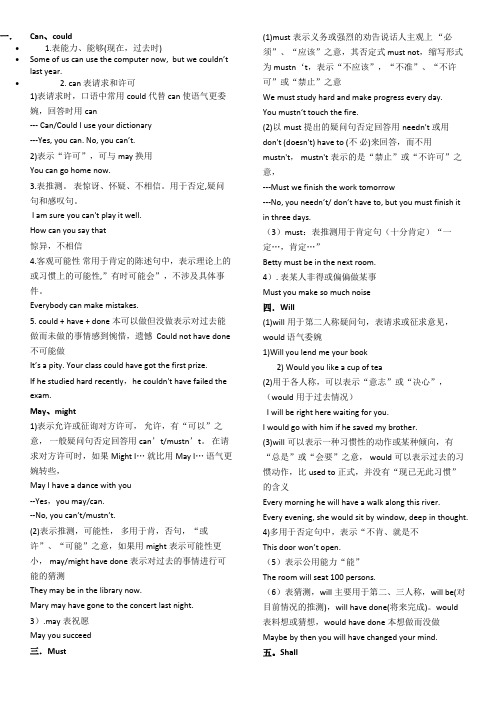
一.Can、could• 1.表能力、能够(现在,过去时)•Some of us can use the computer now, but we couldn’t last year.• 2. can 表请求和许可1)表请求时,口语中常用could 代替 can 使语气更委婉,回答时用can--- Can/Could I use your dictionary---Yes, you can. No, you can’t.2)表示“许可”,可与may 换用You can go home now.3.表推测。
表惊讶、怀疑、不相信。
用于否定,疑问句和感叹句。
I am sure you can't play it well.How can you say that惊异,不相信4.客观可能性常用于肯定的陈述句中,表示理论上的或习惯上的可能性,”有时可能会”,不涉及具体事件。
Everybody can make mistakes.5. could + have + done 本可以做但没做表示对过去能做而未做的事情感到惋惜,遗憾 Could not have done 不可能做It’s a pity. Your class could have got the first prize.If he studied hard recently,he couldn't have failed the exam.May、might1)表示允许或征询对方许可,允许,有“可以”之意,一般疑问句否定回答用can’t/mustn’t。
在请求对方许可时,如果Might I…就比用May I…语气更婉转些,May I have a dance with you--Yes,you may/can.--No, you can’t/mustn’t.(2)表示推测,可能性,多用于肯,否句,“或许”、“可能”之意,如果用might表示可能性更小, may/might have done 表示对过去的事情进行可能的猜测They may be in the library now.Mary may have gone to the concert last night.3).may表祝愿May you succeed三.Must (1)must表示义务或强烈的劝告说话人主观上“必须”、“应该”之意,其否定式 must not,缩写形式为 mustn‘t,表示“不应该”,“不准”、“不许可”或“禁止”之意We must study hard and make progress every day.You mustn‘t touch the fire.(2)以must提出的疑问句否定回答用needn't或用don't (doesn't) have to (不必)来回答,而不用mustn't, mustn't表示的是“禁止”或“不许可”之意,---Must we finish the work tomorrow---No, you needn’t/ don’t have to, but you must finish it in three days.(3)must:表推测用于肯定句(十分肯定)“一定…,肯定…”Betty must be in the next room.4). 表某人非得或偏偏做某事Must you make so much noise四.Will(1)will用于第二人称疑问句,表请求或征求意见,would 语气委婉1)Will you lend me your book2) Would you like a cup of tea(2)用于各人称,可以表示“意志”或“决心”,(would用于过去情况)I will be right here waiting for you.I would go with him if he saved my brother.(3)will可以表示一种习惯性的动作或某种倾向,有“总是”或“会要”之意, would可以表示过去的习惯动作,比used to正式,并没有“现已无此习惯”的含义Every morning he will have a walk along this river. Every evening, she would sit by window, deep in thought.4)多用于否定句中,表示“不肯、就是不This door won’t open.(5)表示公用能力“能”The room will seat 100 persons.(6)表猜测,will主要用于第二、三人称,will be(对目前情况的推测),will have done(将来完成)。
情态动词用法

情态动词用法情态动词是英语中的一类特殊动词,用来表示说话人对某种行为或状态的态度、推测、能力、可能性、建议等。
情态动词常常和动词原形搭配使用,具有一些特殊的语法和用法规则。
本文将详细介绍情态动词的基本用法和几种常见的情态动词。
一、情态动词的基本用法1. 表示能力:情态动词可以用来表示能力或技能。
常见的能力情态动词有can和could。
例如:- I can swim.(我会游泳。
)- She could play the piano when she was young.(她小时候会弹钢琴。
)2. 表示可能性:情态动词可以表示某种行为或状态的可能性。
常见的可能性情态动词有may、might和could。
例如:- It may rain tomorrow.(明天可能会下雨。
)- I might go to the party tonight.(我可能会去参加今晚的聚会。
)- He could be late for the meeting.(他可能会迟到会议。
)3. 表示推测:情态动词还可以用来表示说话人对某种事实的推测。
常见的推测情态动词有must、may、might和could。
例如:- He must be tired.(他一定很累。
)- They may be on vacation.(他们可能在度假。
)- She might have forgotten her keys.(她可能忘记带钥匙了。
)- It could snow tonight.(今晚可能会下雪。
)4. 表示允许和禁止:情态动词还可以表示某种行为的允许或禁止。
常见的允许情态动词有can、may和could,常见的禁止情态动词有mustn't和shouldn't。
例如:- You can go now.(你现在可以走了。
)- May I borrow your pen?(我可以借用你的钢笔吗?)- You mustn't smoke here.(你不能在这里抽烟。
人教版七年级下册英语之情态动词的例句解析

人教版七年级下册英语之情态动词的例句解析本文将为您提供人教版七年级下册英语中情态动词的例句解析。
请注意,情态动词用来表示说话人的态度、推测、能力等,且不能单独作谓语。
以下是一些常见的情态动词及其例句解析:1. Can- I can swim.(我会游泳。
)- Can you help me?(你能帮助我吗?)2. Could- Could you pass me the salt, please?(请你递给我盐好吗?)- They could run fast when they were young.(他们小时候跑得很快。
)3. May- May I use your phone?(我可以用一下你的手机吗?)- It may rain tomorrow.(明天可能会下雨。
)4. Might- He might be late for the meeting.(他可能会迟到开会。
)- I might go to the party if I finish my work early.(如果我早完工了可能会去参加派对。
)5. Shall- Shall we go out for dinner tonight?(我们今晚出去吃饭好吗?)- Shall I help you with your homework?(我帮你做作业好吗?)6. Should- You should eat more fruits and vegetables.(你应该多吃水果和蔬菜。
)- We should study for the exam.(我们应该为考试而研究。
)7. Must- I must finish my project before the deadline.(我必须在截止日期之前完成我的项目。
)- You must wear a seatbelt in the car.(你在车里必须系安全带。
)以上是情态动词的一些例句解析,希望对您有帮助。
情态动词详解+例句

4、should作为情态动词,可以用来表示意外、惊喜或者在说话人看来是不可思议的.尤其在以why, who, how等开头的修辞疑问句或某些感叹句中常常译为“竟会”、“居然”。例如:How should I know it ?我怎么会知道这件事?
2、should作为情态动词,可以用在条件状语从句中,表示语气较强的假设,译作“万一”、“竟然”,这时也可将should置于从句之首,即将should放在主语前面,而省略从属连词if。例如:If you should fail to come, ask Mrs Chen to work in your place.(= Should you fail to come, ask Mrs Chen to work in your place.)
情态动词详解+例句
一、单项选择情态动词
1.I’m sorry, but you _____ go wrong. There’s no such man here.
A.needB.canC.mustD.will
【答案】C
【解析】
【详解】
考查情态动词。句意:很抱歉,但是你一定是弄错了。这儿没有这么个人。A. need需要;B. can能够;C. must必须;D. will将会。must指有把握的推测,“一定;必定”,结合下文There’s no such man here.可知一定是弄错了。故选C。
12.—______ you sing and dance at this late hour of the night?
情态动词详解+例句
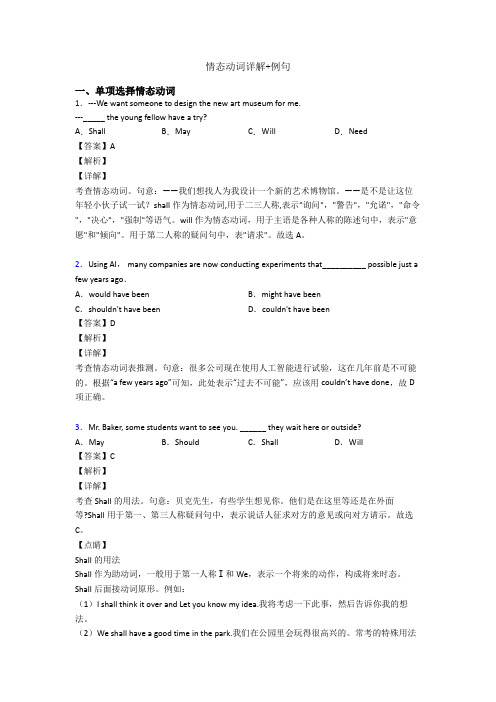
【答案】B
【解析】
【详解】
考查情态动词。句意:——有一台计算机来储存照片真是太棒了。——不要过度依赖它。它有时候也会出故障,你最好做一个备份。计算机出故障这是可能的事情,表示客观可能性用can。must肯定,必须;should应该;will表意愿。故B选项正确。
8.I often felt troubled in my teens and my grandma ________ comfort me, saying “Life is like that, dear”.
11.—______ you sing and dance at this late hour of the night?
—Sorry, I will stop right now.
A.MayB.Shall
C.WillD.Must
【答案】D
【解析】
试题分析:考查情态动词的用法。May可以,可能Shall: 用于第一三人称的疑问句,表示说话人征求对方的意见或向对方请示。用于二三人称的陈述句表示说话人给对方的命令、警告、允诺、威胁或决心等。用于法律、法规条文、合同等,按规定应该履行的义务等。Will表示请求或建议;表示意愿或表示现在的习惯D. Must表示“必须”“一定”“偏要”之意。此处must表示“偏要,偏偏”。句意:——你偏要在深夜又唱又跳吗?——很抱歉,我会马上停止。
考查情态动词。句意:——我们想找人为我设计一个新的艺术博物馆。——是不是让这位年轻小伙子试一试?shall作为情态动词,用于二三人称,表示"询问","警告","允诺","命令","决心","强制"等语气。will作为情态动词,用于主语是各种人称的陈述句中,表示"意愿"和"倾向"。用于第二人称的疑问句中,表"请求"。故选A。
情态动词详解+例句

—His cell phone is here, so he ________ have gone too far.
A.mustn’tB.needn’t
C.wouldn’tD.can’t
5.“should / ought to + have +过去分词”表示过去本该做某事但没做,其否定式表示过去不该做某事但做了,这种句式含有不满或责备之意,ought to的语气比should强一些。如:
You ought to / should have studied harder.你本应该更努力学习的.(但没有)
A.should have avoidedB.should be avoided
C.could have avoidedD.could have been avoided
【答案】D
【解析】
【详解】
考查“情态动词+完成式”。句意:如果愤怒的女乘客和巴士司机保持冷静,这起导致15人死亡的事故本来是可以避免的。could have done“本来能做而没有做”,且句子主语The accident和谓语动词avoid之间是被动关系,结合句意可知答案为D。
1. Shall用于第一人称,表示征求对方的意愿。如:What shall we do this evening?
2. Shall用于第一、第三人称疑问句中,表示说话人征求对方的意见或向对方请示。如:Shall we begin our lesson?When shall he be able to leave the hospital?
【点睛】
情态动词的用法归纳
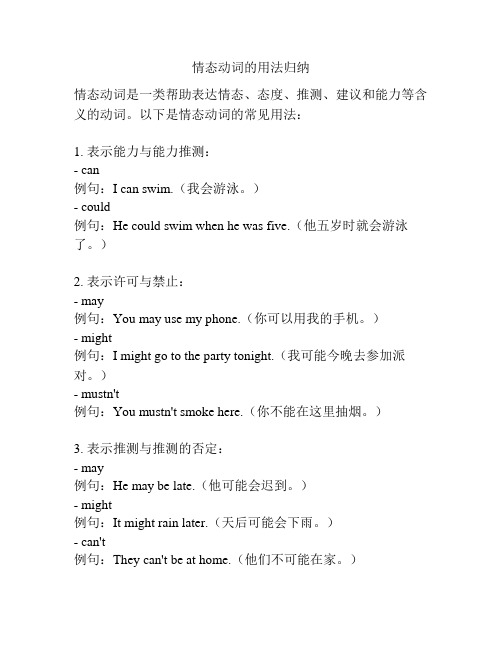
情态动词的用法归纳情态动词是一类帮助表达情态、态度、推测、建议和能力等含义的动词。
以下是情态动词的常见用法:1. 表示能力与能力推测:- can例句:I can swim.(我会游泳。
)- could例句:He could swim when he was five.(他五岁时就会游泳了。
)2. 表示许可与禁止:- may例句:You may use my phone.(你可以用我的手机。
)- might例句:I might go to the party tonight.(我可能今晚去参加派对。
)- mustn't例句:You mustn't smoke here.(你不能在这里抽烟。
)3. 表示推测与推测的否定:- may例句:He may be late.(他可能会迟到。
)- might例句:It might rain later.(天后可能会下雨。
)- can't例句:They can't be at home.(他们不可能在家。
)4. 表示义务与责任:- must例句:We must finish our homework.(我们必须完成作业。
)- have to例句:I have to go to work early tomorrow.(我明天必须早点去上班。
)5. 表示愿望与建议:- should例句:You should exercise regularly.(你应该经常锻炼。
)- ought to例句:They ought to help others.(他们应该帮助别人。
)6. 表示推荐与要求:- would like例句:I would like to have a cup of tea.(我想要一杯茶。
)- need例句:You need to finish this report by tomorrow.(你需要在明天之前完成这份报告。
情态动词的用法总结及例句解析
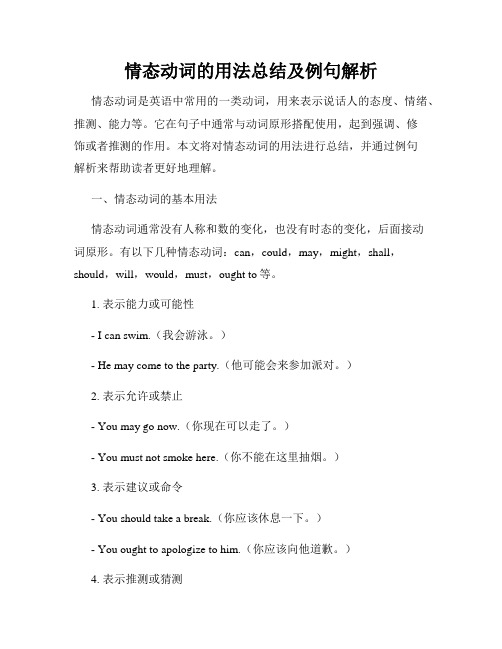
情态动词的用法总结及例句解析情态动词是英语中常用的一类动词,用来表示说话人的态度、情绪、推测、能力等。
它在句子中通常与动词原形搭配使用,起到强调、修饰或者推测的作用。
本文将对情态动词的用法进行总结,并通过例句解析来帮助读者更好地理解。
一、情态动词的基本用法情态动词通常没有人称和数的变化,也没有时态的变化,后面接动词原形。
有以下几种情态动词:can,could,may,might,shall,should,will,would,must,ought to等。
1. 表示能力或可能性- I can swim.(我会游泳。
)- He may come to the party.(他可能会来参加派对。
)2. 表示允许或禁止- You may go now.(你现在可以走了。
)- You must not smoke here.(你不能在这里抽烟。
)3. 表示建议或命令- You should take a break.(你应该休息一下。
)- You ought to apologize to him.(你应该向他道歉。
)4. 表示推测或猜测- He could be there.(他可能在那里。
)- It might rain tomorrow.(明天可能会下雨。
)5. 表示义务或必须- We must finish the project on time.(我们必须按时完成这个项目。
)- You ought to help him.(你应该帮助他。
)二、情态动词的细分用法除了以上的基本用法外,情态动词还有一些特殊的用法,需要注意其具体含义和用法。
1. can 和 could- 表示能力和技能:I can play the piano.(我会弹钢琴。
)- 表示请求或许可:Can I use your computer?(我可以用你的电脑吗?)- could 还可以用来表示过去的能力或许可:When I was young, I could run very fast.(小时候,我跑得很快。
【英语】情态动词详解+例句
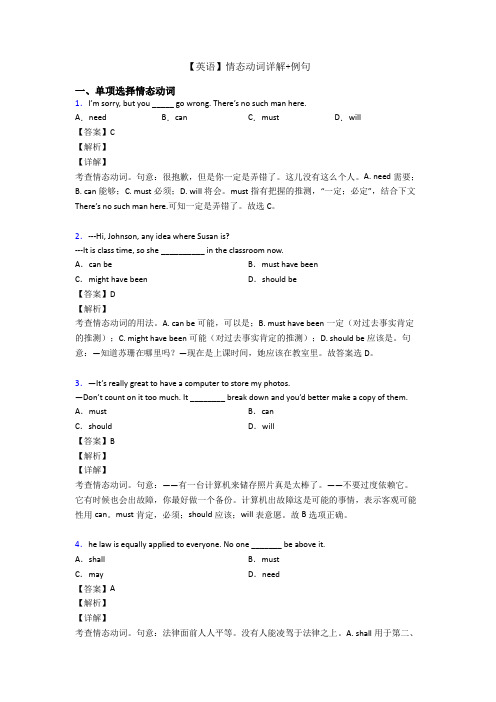
You ought to / should have studied harder.你本应该更努力学习的.(但没有)
【答案】D
【解析】
考查情态动词的用法。A. can be可能,可以是;B. must have been一定(对过去事实肯定的推测);C. might have been可能(对过去事实肯定的推测);D. should be应该是。句意:—知道苏珊在哪里吗?—现在是上课时间,她应该在教室里。故答案选D。
C.willD.must
【答案】A
【解析】
【详解】
考查情态动词词义辨析。A. shall用于法律法规或条文中,表示义务、规定等;B. need需要;C. will会;D. must必须。句意:——我能用信用卡支付么?——对不起,先生,现金支付是我们酒店的管理规定。故A项正确。
8.The weather turned out to be fine. I _____________ the trouble to carry the umbrella with me.
【答案】C
【解析】
考查虚拟语气。——我们上周种的小树怎么了?——这些小树本来会长得很好,但是我们没有给它们浇水。根据语境可知,此处是对过去的事实进行假设,故本题选C。
6.It_____ have been Tom that parked the car here, as he is the only one with a car.
A.mustB.canC.shallD.should
情态动词及用法
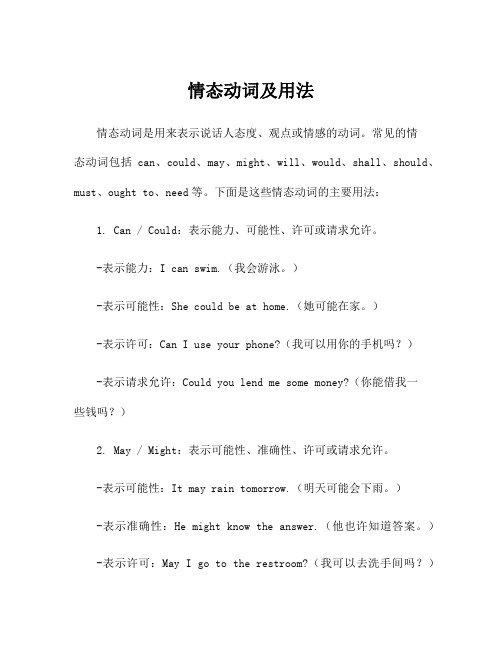
情态动词及用法情态动词是用来表示说话人态度、观点或情感的动词。
常见的情态动词包括can、could、may、might、will、would、shall、should、must、ought to、need等。
下面是这些情态动词的主要用法:1. Can / Could:表示能力、可能性、许可或请求允许。
-表示能力:I can swim.(我会游泳。
)-表示可能性:She could be at home.(她可能在家。
)-表示许可:Can I use your phone?(我可以用你的手机吗?)-表示请求允许:Could you lend me some money?(你能借我一些钱吗?)2. May / Might:表示可能性、准确性、许可或请求允许。
-表示可能性:It may rain tomorrow.(明天可能会下雨。
)-表示准确性:He might know the answer.(他也许知道答案。
)-表示许可:May I go to the restroom?(我可以去洗手间吗?)-表示请求允许:Might I borrow your pen?(我可以借用你的笔吗?)3. Will / Would:表示意愿、习惯、请求、承诺或预测。
-表示意愿:I will help you.(我愿意帮助你。
)-表示习惯:She would always go for a walk after dinner.(她习惯饭后散步。
)-表示请求:Would you please close the door?(请你关上门好吗?)-表示承诺:I would do my best to finish the project.(我会尽力完成这个项目。
)-表示预测:It will rain tomorrow.(明天将会下雨。
)4. Shall / Should:表示建议、命令、义务或预测。
-表示建议:You should exercise regularly.(你应该经常运动。
10个重要情态动词用法详解

1. can⑴ 表示能力,一般译为“能、会”,尤其指生来具备的能力。
如:She can swim fast, but I can’t .⑵ 表示许可,常在口语中。
如: Youcanuse my dictionary.⑶表示推测,意为“可能”,常用于否定句和疑问句中,此时 can’t 译为“不可能”。
如:—Can the news be true? — No, it can’t be our teacher. He is on a visit to the Great Wal l.2. could⑴ can 的过去式,意为“能、会”,表示过去的能力。
如: He could write poems when he was 10.⑵ could 在疑问句中,表示委婉请求的语气,此时 could 没有过去式的意思。
如:Could you do me a favour?—Could I use your pen? —Yes, youcan. (注意回答)3. may⑴ 表示请求、许可,比 can 正式,如: May I borrow your bike? Youmay gohomenow.⑵ 表示推测,谈论可能性,意为“可能,或许”,一般用于肯定句中。
如: Itmay raintomorrow . Shemay be at home.⑶ may 的过去式为 might。
might 也可以表示可能性低于 may (此时 might 没有过去式的意思)。
如: He is away from school. He might be sick.⑷ 表示希望、祈求、祝愿,常可译为“祝愿”。
通常是用 may +主+V如: May you have a good time.May you be happy!May you succeed !4. must⑴ must 表示主观看法,意为“必须”。
如: You must stay here until I come back.Must I hand in my homework right now?⑵对 must 引导的疑问句,肯定回答为 must,否定回答为 needn’t 或 don’t have to .如:— Must I finish my homework? —No, you needn’t.⑶ must 也可以表示有把握的推测,意为“ 一定,肯定”,用于肯定句。
【精品】情态动词详解+例句

精品】情态动词详解 +例句一、单项选择情态动词1.Traveling by subway ___ s ometimes be quite an adventure, especially during the rush hour.C . shouldn't have been【答案】 D【解析】D . couldn't have been详解】 考查情态动词表推测。
句意:很多公司现在使用人工智能进行试验,这在几年前是不可能 的。
根据“a few years age 可知,此处表示 过去不可能”应该用couldn ' t have done 故D 项正确。
3.Mr. Baker, some students want to see you. they wait here or outside? A . MayB .ShouldC .ShallD .Will【答案】 C 解析】详解】 考查 Shall 的用法。
句意:贝克先生,有些学生想见你。
他们是在这里等还是在外面 等?Shall 用于第一、第三人称疑问句中,表示说话人征求对方的意见或向对方请示。
故选C 。
点睛】Shall 的用法Shall 作为助动词,一般用于第一人称 I 和We ,表示一个将来的动作,构成将来时态。
Shall 后面接动词原形。
例如:(1)I shall think it over and Let you know my idea. 我将考虑一下此事,然后告诉你我的想 法。
(2)We shall have a good time in the park. 我们在公园里会玩得很高兴的。
常考的特殊用法1. Shall 用于第一人称,表示征求对方的意愿。
如:A . must 【答案】B B .canC .shallD .should解析】 详解】 考查情态动词。
句意:乘地铁旅行有时可能相当冒险,尤其是在交通高峰期。
情态动词详解+例句

【解析】
【详解】
考查情态动词+have done。句意:“昨晚10点左右你给我打了电话,是吗?”“不,我没给你打电话。一定是别人干的。” must have done是对过去发生的动作最有把握的猜测,意思是“一定”,结合语境可知,我没有打电话给你,因此猜测一定有别人给你打了电话。故选A项。
Somebody must have stolen the ring.肯定有人偷了这枚戒指. [该句所推断的偷窃动作发生在过去.]
The temperature must have dropped to below zero last night, because the water is frozen all over.昨夜的温度肯定降到零度以下,因为水都冻住了。
A.willB.need
C.canD.must
【答案】D
【解析】
【详解】
考查情态动词表推测。句意:房间如此干净,他一定是昨天晚上打扫过了。must have done表示对过去发生的事情有把握的猜测,意思是“一定(做过)”,故D项正确。
4.— Excuse me, do you mind if I open the window?
— Well, if you__________. I can put on more clothes.
A.canB.may
C.mustD.shall
【答案】C
【解析】
【详解】
考查情态动词。句意:-不好意思,我把窗户打开你介意吗?-好吧,如果你必须这么做的话。我可以多穿点衣服。A. can能够;B. may可能;C. must一定;必须;D. shall会;将。must表示偏要,必须要做的事情,故选C。
高中英语情态动词详细讲解及例句
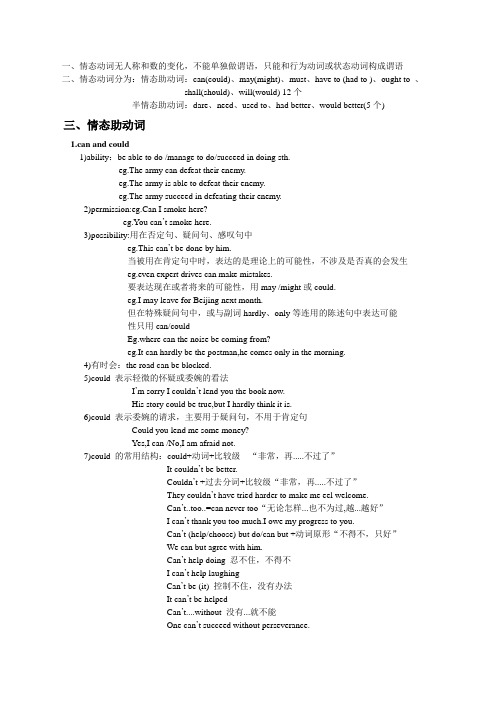
一、情态动词无人称和数的变化,不能单独做谓语,只能和行为动词或状态动词构成谓语二、情态动词分为:情态助动词:can(could)、may(might)、must、have to (had to )、ought to 、shall(should)、will(would) 12个半情态助动词:dare、need、used to、had better、would better(5个)三、情态助动词1.can and could1)ability:be able to do /manage to do/succeed in doing sth.eg.The army can defeat their enemy.eg.The army is able to defeat their enemy.eg.The army succeed in defeating their enemy.2)permission:eg.Can I smoke here?eg.You can’t smoke here.3)possibility:用在否定句、疑问句、感叹句中-eg.This can’t be done by him.当被用在肯定句中时,表达的是理论上的可能性,不涉及是否真的会发生eg.even expert drives can make mistakes.要表达现在或者将来的可能性,用may /might或could.eg.I may leave for Beijing next month.但在特殊疑问句中,或与副词hardly、only等连用的陈述句中表达可能性只用can/couldEg.where can the noise be coming from?eg.It can hardly be the postman,he comes only in the morning.4)有时会:the road can be blocked.5)could 表示轻微的怀疑或委婉的看法I’m sorry I couldn’t lend you the book now.His story could be true,but I hardly think it is.6)could 表示委婉的请求,主要用于疑问句,不用于肯定句Could you lend me some money?Yes,I can /No,I am afraid not.7)could 的常用结构:could+动词+比较级“非常,再.....不过了”It couldn’t be better.Couldn’t +过去分词+比较级“非常,再.....不过了”They couldn’t have tried harder to make me eel welcome.Can’t..too..=can never too“无论怎样...也不为过,越...越好”I can’t thank you too much.I owe my progress to you.Can’t (help/choose) but do/can but +动词原形“不得不,只好”We can but agree with him.Can’t help doing 忍不住,不得不I can’t help laughingCan’t be (it) 控制不住,没有办法It can’t be helpedCan’t....without 没有...就不能One can’t succeed without perseverance.2.may and might1)permission:May I use your pen?Yes,you may./No,you may not.2)Possibility:用于推测,表示不确定,不用于疑问句中She may know Tom’s address.出现I’m afraid.I’m not sure等表示不确定时,常用may/might.I’m afraid he might not come to attend the meeting today.从语气上判断,may表示的可能性比might 大,might更多的表示怀疑He may be very busy now.He might be very busy now.3)用于让步状语从句中However hard you may study,you cannot master English in a month.4)用于祈使句,表示祝愿May you succeed!5)might 常用于表示轻微的责备和委婉的请求You might post the letter for me if you are going near a post box.You might have let me know before!6)习惯用法:may as well do”理所当然,有足够的理由”She may be proud of her sonMay /might (just) as well do=had better do(最好)You might as well stay at home tonight.May/might as well+do A+as+do+B”与其做B不如做A”You might as well throw the money away as lend it to him.One may as well not know a thing at all as know it but imperfectly3.must and have to1)表示义务,一定要,必须You must arrive in good time.The meeting is very important.2)表示肯定性或难以避免,必然会,肯定会All men must die.3)must 表示有把握的推测,一定是,准时Must do/must be doing/must have doneThe tall fellow must be a basketball player.Let’s have something.You must be starving.He must have received mu letter which has mailed last week.4)must 表示非要,偏要,常以第二人称为主语,意指不耐或令人不愉快的事情,用于其他人称,表示主语固执,意为偏偏Why must you buy that car?Jane was never a pleasant young girl.After you gave her your advice,she must goand do the opposite.5)must 的三种否定形式表示不可能must be --can’t be must have done--can’t have doneYou must have met him before.You can’t have met him before.表示不必must do--need not to/don’t have toWe must get up at six tomorrow morning.We don’t have to get up at six tomorrow morning.表示决不能,严禁must--mustn’tYou mustn’t park your car here.6)回答以must提问的句子Must we clean all the rooms?Yes ,you must/No ,you don’t have to/No ,you needn’t7)must 可做名词,表示必须有的东西,必须做的事Warm clothes are a must in the mountains.8)must和have to 表示必须时,有一下差别Must 表示的是说话人主观的看法,而have to则往往强调客观需要The play is not interesting ,I really must go now.I have to work when I was your age.Must 一般只表现在,have to 则有更多的时态。
高考情态动词讲解

情态动词考点一:情态动词表示能力1.表现在的或一般的能力:can/be able tocan比be able to使用得更普遍。
can侧重指有能力做某事; be able to更强调通过努力、克服困难做成某事。
例题:A computer can't think for itself;it must be told what to do.He is a native speaker of English, so he can of course speak English quite well.2.表示将来的能力:will be able to例题:If you have a good sleep,you will be able to work out this problem. 如果你睡个好觉,你就能做出这道题。
3.表示过去的能力:could/was(were) able to/could have donecould表示过去一般的能力,即不表示做或未做某事;was (were) able to do则表示过去有能力并且成功地做了某事,相当于managed to do sth./succeeded in doing sth.Could have done 表示过去有能力做但未做;例题:The fire spread through the hotel very quickly but everyone was able to get out.(过去有能力做并且成功做成了)I could have worked out the question, but I was too nervous.(本来有能力做但未做)考点二:情态动词表示推测(可能性)可能性可分为客观的(理论的)可能性和具体事情实际发生的可能性。
1.客观的(理论的)可能性指并不涉及具体某事是否会发生,此种用法常常可以说明人或事物的特征。
情态动词及例句
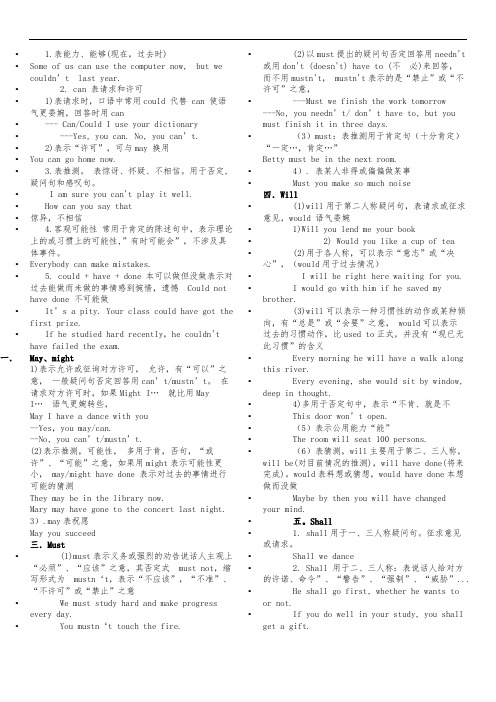
• 1.表能力、能够(现在,过去时)•Some of us can use the computer now, but we couldn’t last year.• 2. can 表请求和许可•1)表请求时,口语中常用could 代替 can 使语气更委婉,回答时用can•--- Can/Could I use your dictionary•---Yes, you can. No, you can’t.•2)表示“许可”,可与may 换用•You can go home now.• 3.表推测。
表惊讶、怀疑、不相信。
用于否定,疑问句和感叹句。
• I am sure you can't play it well. •How can you say that•惊异,不相信• 4.客观可能性常用于肯定的陈述句中,表示理论上的或习惯上的可能性,”有时可能会”,不涉及具体事件。
•Everybody can make mistakes.• 5. could + have + done 本可以做但没做表示对过去能做而未做的事情感到惋惜,遗憾 Could not have done 不可能做•It’s a pit y. Your class could have got the first prize.•If he studied hard recently,he couldn't have failed the exam.一.May、might1)表示允许或征询对方许可,允许,有“可以”之意,一般疑问句否定回答用can’t/mustn’t。
在请求对方许可时,如果Might I…就比用MayI…语气更婉转些,May I have a dance with you--Yes,you may/can.--No, you can’t/mustn’t.(2)表示推测,可能性,多用于肯,否句,“或许”、“可能”之意,如果用might表示可能性更小, may/might have done 表示对过去的事情进行可能的猜测They may be in the library now.Mary may have gone to the concert last night.3).may表祝愿May you succeed三.Must•(1)must表示义务或强烈的劝告说话人主观上“必须”、“应该”之意,其否定式must not,缩写形式为mustn‘t,表示“不应该”,“不准”、“不许可”或“禁止”之意•We must study hard and make progress every day.•You mustn‘t touch the fire.•(2)以must提出的疑问句否定回答用needn't 或用don't (doesn't) have to (不必)来回答,而不用mustn't, mustn't表示的是“禁止”或“不许可”之意,•---Must we finish the work tomorrow ---No, you needn’t/ don’t have to, but youmust finish it in three days.•(3)must:表推测用于肯定句(十分肯定)“一定…,肯定…”Betty must be in the next room.•4). 表某人非得或偏偏做某事•Must you make so much noise四.Will•(1)will用于第二人称疑问句,表请求或征求意见,would 语气委婉•1)Will you lend me your book• 2) Would you like a cup of tea •(2)用于各人称,可以表示“意志”或“决心”,(would用于过去情况)• I will be right here waiting for you.•I would go with him if he saved my brother.•(3)will可以表示一种习惯性的动作或某种倾向,有“总是”或“会要”之意, would可以表示过去的习惯动作,比used to正式,并没有“现已无此习惯”的含义•Every morning he will have a walk along this river.•Every evening, she would sit by window, deep in thought.•4)多用于否定句中,表示“不肯、就是不•This door won’t open.•(5)表示公用能力“能”•The room will seat 100 persons.•(6)表猜测,will主要用于第二、三人称,will be(对目前情况的推测),will have done(将来完成)。
- 1、下载文档前请自行甄别文档内容的完整性,平台不提供额外的编辑、内容补充、找答案等附加服务。
- 2、"仅部分预览"的文档,不可在线预览部分如存在完整性等问题,可反馈申请退款(可完整预览的文档不适用该条件!)。
- 3、如文档侵犯您的权益,请联系客服反馈,我们会尽快为您处理(人工客服工作时间:9:00-18:30)。
情态动词详解 +例句一、单项选择情态动词1.No driving after drinking is a rule that every driverC .may 【答案】 B【解析】2.-- Did Jim come?A . wil lB . shall 试题分析:考察情态动词。
A.将要B 将要C 可能 D.可以。
Will 表示请求、建议、意志、愿望和决心。
Shall 用于第二、第三人称,表示说话人给对话的命令、 May 表示请求和允许;用于祈使句表示决心;表示推测、可能性。
允许。
句意:酒后驾车是每一位驾车者在我们国家应当遵守的规则。
考点:考察情态动词 警告、允诺或威胁。
Can 表示能力;请求和 故选 B 。
obey in our country.D . can-- I don ' t know. He A . might have come C . must have come while I was out.B .might come D . should have come解析】【详解】 考查情态动词推测用法。
句意: Jim 来了吗? --我不知道,在我不在的时候,可能来过。
根 据前文I don ' t kno 可知,说话者不知道 Jim 来没来,因此后文推测来过,但是语气很不确 定,故可知选 A 。
对过去情况的推测为情态动词+have done , must have done —定做了某事, should have done 应该来过,不符合,故选 【点睛】A 。
情态动词+have+过去分词的用法,表示推测或判断过去的情况。
can/could+have+ 过去分词用法: ① 多用于否定句和疑问句中。
表示对过去某事发生的可能 性的否定或质疑,意为:不可能(已经) ............................. 了-(否定句) /可能(已经) 了嘛?-(疑 问句) ② 用于肯定句中。
表示对过去没有做某事的遗憾,含有轻微的责备,意为:本来可以 . 的(但实际上没有 ...... )。
You could have done better, but you were toocareless. (肯定should/ought to+have+ 过去分词用法:责备的意思,意为:本来应该 .......... 的 做了某事的责备,意为:本来不应该 用于肯定句中。
表示对过去没有做某事的遗憾,含有 但实际上没有 ................... )。
用于否定句中 -表示对过去已经 .. 的(但实际上已经了)。
He should have beenasleep.(肯定句,他本应去睡觉的) 去睡觉的)。
He shouldn't have been asleep. (否定句,他本来不应该may/might+have+ 过去分词用法:用于肯定句和否定句中,表示对过去发生某事的可能性的 推测,意为:或许(已经) ................. /或许还没有 ... 。
It is too late. He may have gone/或许还没有must+have+过去分词用法:表示对过去发生的事情十分肯定的推测。
must 表示推测时,不解析】 详解】must have done 用法辨析must have done :表示对过去的肯定的逻辑推测,推定某件事情、动作或状态可能在过去发 生过(存在过)。
He must have been a doctor, for he knows medicine so well. 他过去肯定是一位医生,他对医学 如此了解。
Somebody must have stolen the ring. 肯定有人偷了这枚戒指 . [ 该句所推断的偷窃动作发生在 过去 .]The temperature must have dropped to below zero last night, because the water is frozen all over. 昨夜的温度肯定降到零度以下,因为水都冻住了。
如果“must + have +过去分词”句型与by now 连用,还可以表示对现在完成的动作和状态的 肯定推测,但实质上还是指所推测的过去的动作。
例如:They started early this morning; they must have arrived by now. 他们今晨很早就出发了,现在能用在否定句和疑问句中。
I must have forgotten to tell you. (must 的引入,表达了说话者对 过去忘记告诉你的这件事肯定推测)needn't+have+ 过去分词用法:表示对过去已经做了某事的后悔,意为:本来可以不必经 .. )You needn't have taken a taxi here, for it was very near tomy home.的(可实际上却已3. Ann said whenever her father was unhappy he something large and useless. A . should go out and buy something, usuallyB .couldC . would【答案】 C D .might解析】【详解】 考查情态动词。
句意:安说无论什么时候她父亲不高兴的时候,他就会出去买些东西,通 常是一些又大又没用的东西。
A. should 应该;B. could 能;C. would 总是,愿意;D. might可能。
此处表示过去经常习惯做某事,故选C 。
4. It is really cold and the ground is wet; it have rained last night. A . might C .can【答案】 BB . D . must should考查情态动词辨析。
句意:天气很冷而且地面是湿的, 昨晚一定下了雨。
根据上文theground is wet 可知, “昨晚下了雨 ”是肯定的,故用去十分有把握的推测,故选 【点睛】must have done 必“定做了”表示对过B 。
肯定已经到了。
中国学生的常见病句是: They...; they certainly have arrived. 病句的句义是 “他们当然已经到 达了。
”(这不是对过去的肯定推测,而是断定动作已经完成。
)5.—It 's really great to have a computer to store my photos.—Don 't count on it too much. It ___ break down and you'd better make a copy of them.A . mustC . should【答案】 B D .will解析】 详解】有一台计算机来储存照片真是太棒了。
它有时候也会出故障,你最好做一个备份。
计算机出故障这是可能的事情,表示客观可能 性用can 。
must 肯定,必须;should 应该;will 表意愿。
故 B 选项正确。
考查情态动词。
句意: 不要过度依赖它。
6. He is a bad-tempered fellow, but he be quite charming when he wishes. A . shall B .should C .can 【答案】 C D .must解析】 详解】考查情态动词辨析。
句意:他是个脾气不好的家伙,但当他希望自己有魅力的时候,他可 以变得相当可爱。
此处表示 “能、可以 ”,故 C 项正确。
7The room is so clean. He have cleaned it yesterday evening. A will need C .can 【答案】 D D must 解析】 【详解】 考查情态动词表推测。
句意:房间如此干净,他一定是昨天晚上打扫过了。
表示对过去发生的事情有把握的猜测,意思是 “一定(做过) ”,故 D 项正确。
must have done 8. One of our rules is that every student A mightwear school uniform while at school. B .couldC.shallD.will 【答案】C解析】详解】C. may (可以,能够)表允许时一般不与第三人称连用。
有必要 ) 需要;故选 A 。
10. -- Turn off the TV, Jack. _ -- Mum, just ten more minutes, please. A . Will you be doing C . Shouldn't you be doing【答案】 Cyour homework now? B . Should you bedoingD .Couldn 't you be doing考查情态动词辨析。
句意:我们其中一条规则要求每个学生在校期间都要穿校服。
shall可以表示 命令,警告,强制要求;允诺;法律,规定要做 ……”结合句意可知 C 正确。
9.he law is equally applied to everyone. No one A . shall B .must be above it. C .may 【答案】 A D .need 解析】 【详解】 考查情态动词。
句意:法律面前人人平等。
没有人能凌驾于法律之上。
A. shall 用于第二、第三人称,则含有命令、警告、允诺或威胁的语气。
B. must (必须,一定)用于肯定句。
解析】 详解】 考查含情态动词的进行时态。
句意: 妈妈,请再给我十分钟。
此处表示目前应该在做某事, 的进行时态,故选 C 。
把电视关掉,杰克。
你现在不应该做作业吗 ?— should “应该 ”,这里用含情态动词 11. The professor warned the students that on no account class. use mobile phones in his A . should theyC . dare they【答案】 A B . they should D . they dare 解析】 详解】 考查部分倒装和情态动词。
句意:这位教授警告学生们,在他的课堂上,决不应该使用手 机。
on no account 意为决不”否定词放在句首,句子使用部分倒装,排除 B 、D 项;这里 表示应该,故选 A 。
